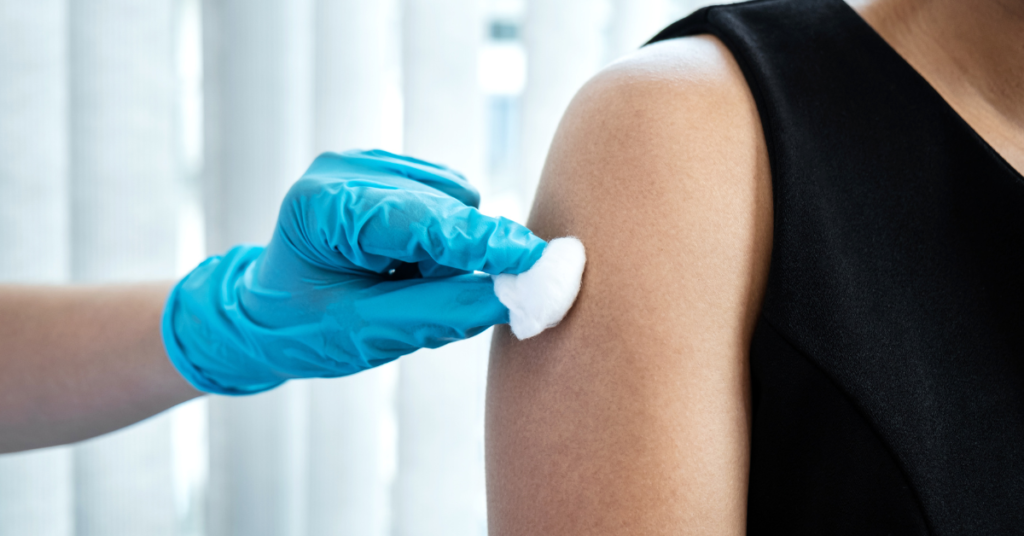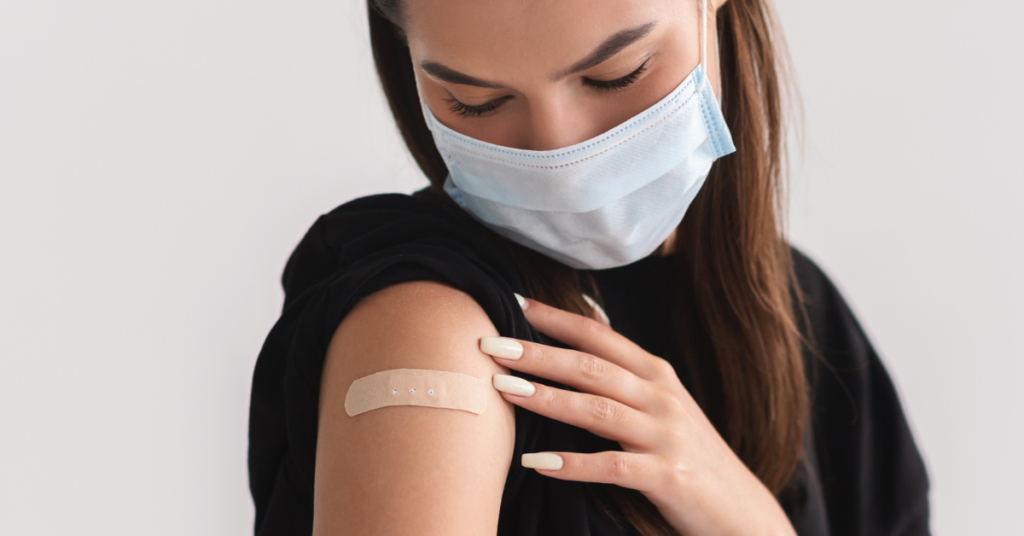Let’s be real: Nobody likes getting sick.
When it comes to protecting ourselves against sickness, vaccines are one of the most powerful tools we have in our modern-day tool belts. Yet, there’s a lot of skepticism surrounding vaccines, particularly following the aftermath of the COVID-19 pandemic.
Lately, we’ve heard a lot of inquiries circulating about how (or if!) vaccines work. That, and the follow-up, “Why should I get the vaccine if I could still get sick?”
And you know what? That’s a good question!
We empathize with the curious minds of our communities, and we want to validate the feelings that come up around vaccination. Especially considering the time and effort that goes into the process — not to mention the side effects — staying up-to-date on your seasonal vaccines isn’t always easy.
However, one thing we can do to make the vaccination experience less stressful is to clear up a common myth. So let’s dive into an interesting concept called sterilizing immunity! Because vaccines do work, even if you might still contract the illness after vaccination. And understanding sterilizing immunity is the first step to understanding the larger goals of vaccine science.
In This Article:
- What Is Sterilizing Immunity?
- Why Is Sterilizing Immunity Difficult — Or Often Impossible — to Achieve?
- Should You Get Vaccinated, Even If You Might Still Get Sick?
What Is Sterilizing Immunity?
If you pose this query to our friend Google, you’ll likely receive an answer that looks like this:
Sterilizing immunity is the elimination of a pathogen before it replicates in the host.
But let’s break this concept down in more direct terms. First, it’s important to wrap our heads around how vaccines are designed to work in the body.
Using small portions of active ingredients, or antigens, the shots you receive introduce your immune system to a specific illness. This part of the process is like showing your immune system a mugshot of the disease. Then, having become familiar with the ugly mug of illness, your body develops specialized cells, or bodyguards, to keep you protected against it.
The next time this illness shows up to the party in your body, it will be swiftly dealt with via these specialized bodyguard cells.

In the context of vaccinology, sterilizing immunity refers to the protection provided by a vaccine that completely prevents infection by a pathogen. When a vaccine induces sterilizing immunity, it means that not only does it protect the individual from becoming ill, but it also prevents the pathogen from entering the body and multiplying at all.
Most people believe that this is the end result of all vaccines, but that’s not really the case. Sterilizing immunity is actually the ultimate goal in vaccine science, and it’s an incredibly hard goal to achieve.
Learn More: Vaccine Ingredients in 2024: Less Scary Than You Might Think
Why Is Sterilizing Immunity Difficult — Or Often Impossible — to Achieve?
Before we dive into what makes sterilizing immunity such an onerous objective, let’s make one thing clear. When a vaccine does prevent you from getting sick at all, that’s great!
Vaccine scientists and experts are always striving to make sterilizing immunity possible for individual diseases. But, if it wasn’t clear in the section above, vaccines are designed, above all, to give your body a fighting chance against illness. When that results in fewer hospitalizations and fewer deaths, they’re happy and so are we.
Now that we all have a firm grasp on the realistic targets of vaccine science, let’s break down why sterilizing immunity is so difficult to achieve.
1. The Asymptomatic Nature of Early Infections
Some pathogens can infect a person without causing noticeable symptoms, particularly in the early stages. This means that an infected person may not even realize they are carrying the virus, making it difficult for vaccines to offer complete protection.

For instance, individuals infected with viruses like COVID-19 can transmit the virus to others even if they don’t exhibit symptoms. This asymptomatic transmission complicates the idea of sterilizing immunity, as a vaccinated person might still be a carrier, albeit with reduced viral load and a lower likelihood of severe illness.
Learn More: 2024 COVID-19 Vaccine Rundown: Everything You Need to Know
2. The Diversity and Mutation of Pathogens
Pathogens, particularly viruses, are notorious for their ability to mutate and adapt. Influenza, for example, undergoes frequent changes that can render previous vaccines less effective. Each year, scientists must predict which strains will circulate and update the vaccine accordingly.
This ever-changing landscape makes it challenging to create a vaccine that provides sterilizing immunity against all possible variants. Even with strong initial immunity, the emergence of new variants can still lead to breakthrough infections, emphasizing the need for ongoing vaccination efforts and updates.
Learn More: Comparing Flu Shots: Which Influenza Vaccine Should I Get?
3. The Variability of Individual Immune Responses
Every person’s immune system is unique. Your individual sense of wellness is influenced by factors like genetics, age, and health history. This variability means that a vaccine may elicit a strong protective response in some individuals but not in others.
For instance, older adults or individuals with compromised immune systems might not respond as robustly to a vaccine as younger, healthier individuals. As a result, even if a vaccine is designed to induce sterilizing immunity, its effectiveness can vary, leading to situations where some vaccinated people may still contract the illness.
Learn More: Vaccine Science 101: What’s Really Going On Under the Microscope?
Should You Get Vaccinated, Even If You Might Still Get Sick?
Short answer: Yes, you should still get vaccinated if you’re eligible and able to receive vaccines.
However, we want to reiterate the sentiment expressed at the beginning of this blog. We understand that getting vaccinated, while simpler in our modern times, isn’t always easy. Some individuals may have to take off work and arrange transportation, and others may experience side effects for days.
While we advocate for the protection of our communities via vaccinations, we still acknowledge that it isn’t always an uncomplicated endeavor. That being said (again!), here are three reasons why you should still get vaccinated even if sterilizing immunity isn’t possible for the disease you’re trying to prevent.

1. Reduced Severity of Illness
Vaccines are particularly effective at reducing the severity of illness if you do get infected. This means fewer hospitalizations and a lower risk of death.
For instance, data has consistently shown that vaccinated individuals who contract illnesses like COVID-19 tend to experience milder symptoms compared to those who are unvaccinated. This reduction in severity not only benefits the individual but also alleviates the burden on healthcare systems, allowing medical resources to be allocated to those in greater need.
Learn More: Vaccine Season Preview: 2024-2025
2. Prevention of Long-Term Complications
Some diseases can lead to long-term health issues even after recovery.
Even infections from viruses like influenza or COVID-19 can result in long-lasting complications such as lung damage or fatigue. Vaccination significantly lowers the risk of experiencing these long-term effects, ensuring better overall health outcomes. By getting vaccinated, you are not only protecting yourself from immediate illness but also from the potential chronic issues that could arise later.

Learn More: Understanding Long-Term Vaccine Safety: What Are the Risks?
3. Herd Immunity
Vaccination contributes to herd immunity, which is crucial for community protection. When a significant portion of the population is vaccinated, the spread of the disease is then significantly reduced.
By reducing the spread of disease, we’re able to offer better protection to those who cannot be vaccinated due to medical reasons, such as allergies or weakened immune systems. This communal effort helps safeguard vulnerable populations, including infants and the elderly, who may be at greater risk for severe illness.
Learn More: Debunking 5 Common Vaccine Myths: What the Science Really Says
Sterilizing Immunity: The Ultimate Goal, But Not the Only Goal
While the idea of sterilizing immunity is an important goal in vaccine development, it is not the sole reason for vaccination. Vaccines serve a broader purpose that goes beyond individual protection. They contribute to public health, reduce the overall burden of disease, and protect the most vulnerable among us.
In a world where pathogens can mutate and spread rapidly, the importance of vaccines cannot be overstated. They are a crucial line of defense against many preventable diseases. So, even if you might still get sick after vaccination, the benefits of getting vaccinated far outweigh the risks.
Remember, when you get vaccinated, you’re not just protecting yourself. You’re also doing your part to protect your community and help us all move toward a healthier future.
So roll up your sleeve, schedule your seasonal vaccines, and join the fight against infectious diseases. Your body and your community will thank you!
